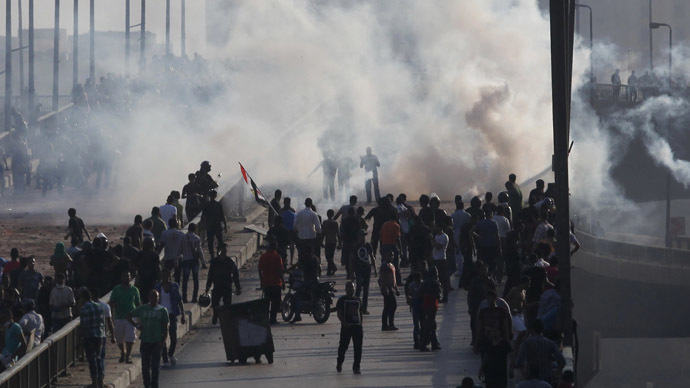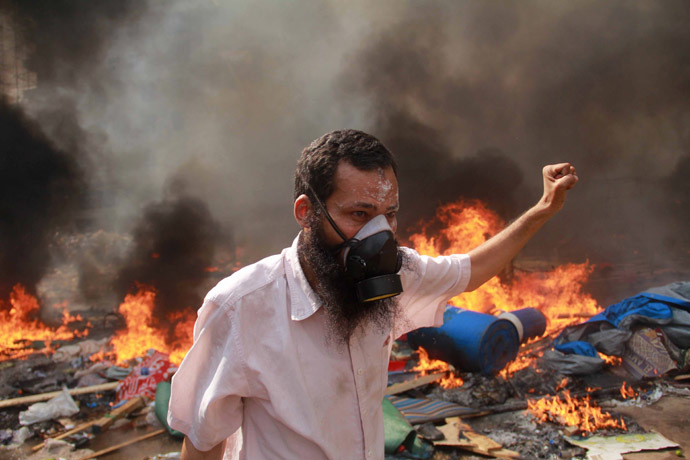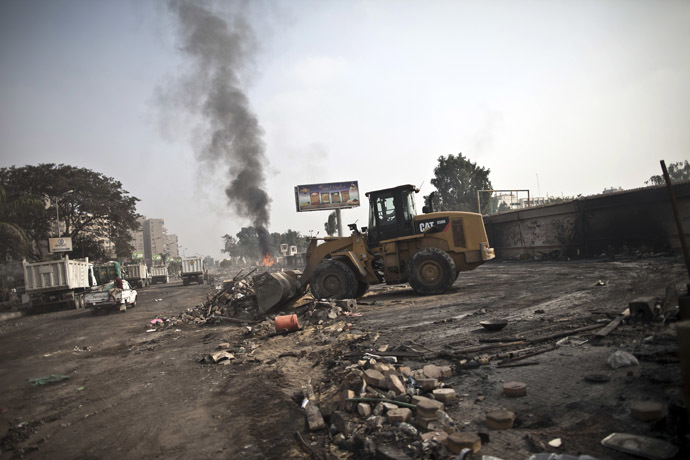Egypt: Arab Spring turns to winter

Did anyone ever imagine that less than three years after the mass street protests dethroned the last Egyptian pharaoh – President Hosni Mubarak, the country would turn into chaos?
The events in Egypt are changing with breakneck speed dragging
the Arab world's most populous nation into fratricidal conflict.
The policy of national reconciliation, proclaimed by the interim
Egyptian government after ousting President Mohamed Morsi from
power has ended with the worst violence since independence this
week. A deadly crackdown on two anti-government sit-ins in Cairo,
launched by the security forces has resulted in an unprecedented
number of dead.
Judging by latest media reports, the pendulum in Egypt is moving
wildly, leaving no breathing space for all actors of this human
tragedy. Once a magnet for outsiders – seductive and enigmatic,
today’s Cairo looks more like a war-zone with helicopters
circling over its main squares, tear gas in the air, sporadic
gunfire, and snipers operating from rooftops.
The initial euphoria over the “democratic revolution” in Egypt,
once labeled by President Obama as the Arab Spring, has given way
to a nasty Arab Winter full of hatred, agony and
despair.
President Mubarak was overthrown as an autocratic leader, who
lost the sense of reality and tried to preserve an ageing
political system – obsolete and fitting no more into the
futuristic picture of the newly-emerging “democratic Middle
East”. However, today even Mubarak’s most vocal opponents would
probably be forced to call the time before his dramatic departure
– another twist of history – “a golden age”, compared to what
Egypt is facing now.

In fact, today the choice is between bad and wore: Egypt would
became either a regular military dictatorship – an iron fist,
tolerating no dissent - or a failed state at the heart of the
Middle East torn by snowballing violence and sliding into chaos.
And even the rosy optimists would not argue that the country
still has a chance to regain its role as a political leader and
economic powerhouse of the Middle East, attracting thousands of
tourists to its magnificent pyramids, Red Sea resorts and the
mysteries of the Nile. The chance has been lost, lost for long
years.
What went wrong with the Arab Spring in Egypt so that today the
streets are awash with blood? The movement was full of
controversy from the very start. However, the last nail in the
coffin of the “democratic revolution” was the July 3 coup, which
brought an abrupt end to President Mohamed Morsi’s one-year rule.
The Muslim Brotherhood challenged “the sedition” by the
generals. Angered by what was seen as “stealing the presidency”
from the only legitimate leader, the Brotherhood has called on
its followers to raise against “a man appointed by
putschists” and reinstate Morsi as president.
This ensured the failure of the Egyptian military to stage a
velvet coup and ensure swift power transition to ex-head of the
Constitutional Court Adli Mansour as interim president. It was at
that point that the army, which has masterminded the coup,
crossed the Rubicon. While General Abdel Fattah al-Sisi, the head
of the army and the man behind the overthrow of Morsi was hailed
by his brothers in arms as "Egypt's devoted son", Interim
President Adly Mansour announced that “the state will impose
order by all force and decisiveness”.

I believe that by taking on the Muslim brotherhood in such a
ruthless way, the Egyptian military has walked into a mine field.
The seasoned Islamist movement with its long history as an
underground political force in Egypt has the potential to
mobilize millions of supporters – disciplined, motivated and
ready to sacrifice their lives “for Islam” and finally bring
military rule down – regardless of what the cost would be. The
protests are led by the Anti-Coup Alliance of Islamist groups
which are enjoying the support of grass-root Islamist diehards,
some of them calling themselves “Martyrs of the Coup”.
Moreover, Egypt’s Islamist leaders can rely not only on their
followers inside the country, but also support from without. This
is what makes the current fallout of the Arab Spring in Egypt
extremely dangerous. Even before this week’s massacre,
Brotherhood leaders have called on the international community to
intervene, paving the way for foreign actors to step in. Some
reports say Syrian rebels are already in Egypt, attacking regular
troops and provoking more violence. This week’s massacre is only
pushing the country toward a Syrian-type armed
conflict.
So, all in all, Egypt has a full potential to evolve into a new
springboard of global jihad – once a remote scenario that is now
becoming a reality. Another twist of Egyptian history that would
serve as a stern warning to enthusiasts of the Arab Spring.
The statements, views and opinions expressed in this column are solely those of the author and do not necessarily represent those of RT.
The statements, views and opinions expressed in this column are solely those of the author and do not necessarily represent those of RT.













